Existing User Log In
New User Registration
Register for a free account to gain full access to the VGChartz Network and join our thriving community.



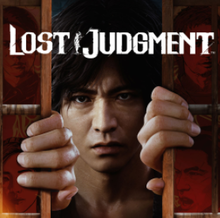

America - Front
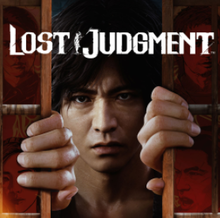

America - Back

Sega
Action
 (Add Date)
(Add Date) (Add Date)
(Add Date) (Add Date)
(Add Date)
| Owners: | 0 |
| Favorite: | 0 |
| Tracked: | 0 |
| Wishlist: | 0 |
| Now Playing: | 0 |
If video games have taught me anything, it’s to make sure that if I ever travel to Japan, I never get caught up in illegal or even remotely shady activity. Ace Attorney has made it abundantly clear that if I have to go to court, I’m likely to face a court that views me as guilty until proven innocent, and a prosecutor that will continuously physically harass my attorney. And with the Judgment games, we can now safely assume that even if the police don’t actually suspect me of a crime yet, independent detectives are well within their jurisdiction to break down my door and spin kick me in the face repeatedly until I confess to any potential misdeeds.
If you’re not actually familiar with the Judgment titles, they're essentially Yakuza games after Sega promised that Yakuza 6 would be the last one and then realized that a life without Yakuza was a life without purpose. They play very similarly; open world sandboxy titles where you beat up a bunch of people in Tokyo, get distracted by some minigames, and then eventually have a climatic fistfight on top of a very tall tower or a boat. The first title, Judgment, introduced us to Takayuki Yagami, a lawyer turned private investigator who knows several different styles of kung fu, serves as a food critic, is well versed in parkour, fixes broken locks, and, oh yeah, occasionally actually solves cases. And he also dresses like a cross between a One Direction back-up singer and a motorcycle gang member, in case he wasn’t quite cool enough for you all yet.
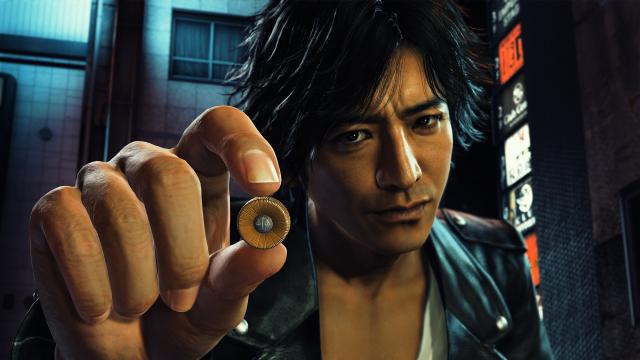
But that’s all par for the course for Yakuza titles. Previous and current Yakuza protagonists Kazuma Kiryu and Ichiban Kasuga are both ostensibly members of criminal syndicates, despite spending most of their time preventing crimes, so a detective actually spending at least some of his time investigating is, if anything, a step in the right direction. RGG studios games pretty much define themselves by how wacky and absurd the side activities are, and how easy it is to find yourself doing something entirely unrelated to the main character’s actual profession.
In similar fashion to previous Yakuza and Judgment titles, Lost Judgment kicks off with the main character investigating an initially innocuous-sounding incident, in this case bullying within a private high school. This event inevitably turns out to be merely part of a much larger web of intrigue, and eventually connects to an absurdly complex plot that inevitably involves manipulating the justice system and criminal underworld of Tokyo. Takayuki finds himself having to contend with a number of dangerous foes as he attempts to unravel the secrets of this new plot, including a new gang faction that now commands the criminal activity of Kamurocho and Yokohama after the big thing that happened towards the end of Yakuza: Like a Dragon. It’s a nice bit of continuity in referencing an important story event from mainline Yakuza releases after the original Judgment was largely silent on that front.
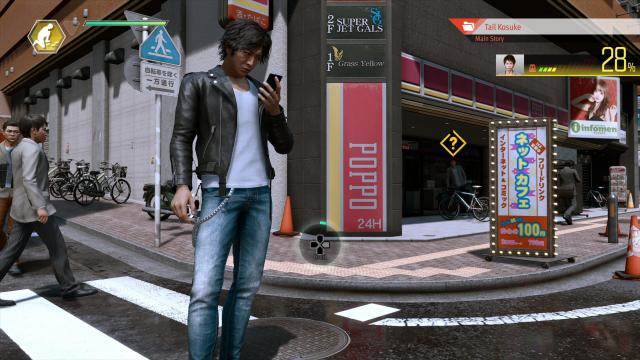
Speaking of prior Yakuza titles, the gameplay should be pretty familiar to long-time series fans at this point, with much of the same faithful street brawling combat mixed with bizarre side activities. There are a couple of notable changes from the first Judgment, however, with perhaps the biggest being that the sandbox area itself has changed. Whereas the first Judgment took place in the series’ tried and true old stomping grounds of Kamurocho, Lost Judgment shifts predominantly to Like a Dragon’s setting of Yokohoma. While it is nice to have a much bigger sandbox on hand compared with the previous Judgment, it doesn’t feel like the amount of content has been expanded to accommodate it, and as a result all that’s really been added is a longer commute and the chance to buy some snacks from the nice old lady at Ichiban confections.
The core gameplay mechanic upon which everything else revolves around is still the combat. In Judgment the standard brawling combat was probably the best it’s ever been across both series, and it transfers mostly unchanged to Lost Judgment. Fighting enemies still feels great and flows very well, with most of the jankiness that accompanied combat from previous Yakuza games having been polished away. Transitioning from offense to defense feels fast and fluid, whereas it always felt like more of a sticking point in the Yakuza releases, with the attacking being very committal. Combat still feels a bit simplistic, but it’s a marked improvement over the Kiryu games.
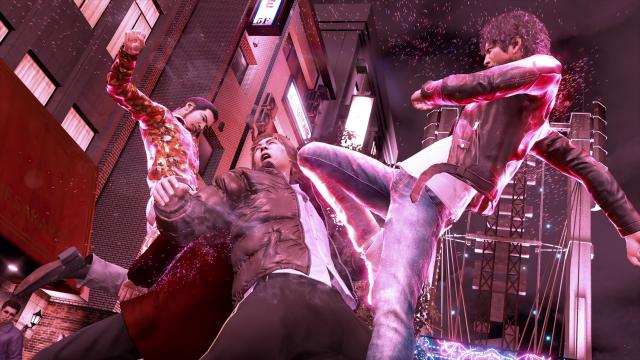
The biggest change in the combat probably comes in the form of an additional style. Whereas the original Judgment presented players with two styles - one for dealing with groups of fodder enemies and one more directed at encounters with a singular tougher enemy - Lost Judgment attempts to mix that up by providing the player with a new, third style that at least theoretically is intended to revolve around countering and a mostly defensive playstyle. However, at least on a first playthrough, it feels like it lets you punch and kick just as functionally as the other two styles. I personally never found much reason to select anything else beyond occasionally just wanting to look stylish, especially since it mixes in some very handy command grabs into the standard combo strings.
Lost Judgment also carries over some of the wonkier elements of the previous title too. Every so often, Takayuki will be thrust into an Ace Attorney-esque mini investigation sequence, where he has to examine the environment and discover clues, point and click style. This usually culminates in the player being asked several questions and having to present the correct evidence to answer each one, although the answers are almost always incredibly obvious. I probably dislike these segments more than anything else in the game, as they ultimately just come down to pixel hunts in most cases; they're less tests of skill or knowledge of the game mechanics and more tests of patience as you scour a room looking for the “examine” prompt to show up.
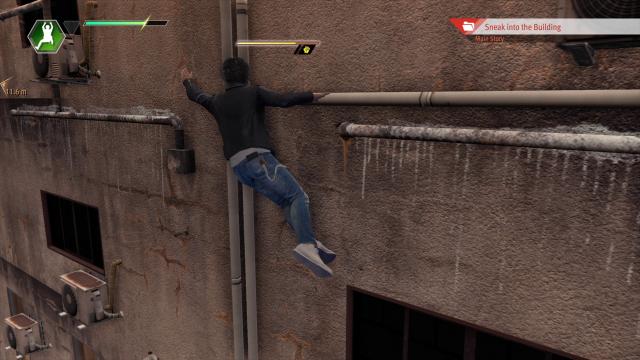
The stealth/tailing segments, where you slowly move around and try to avoid detection, are back as well. Walk slowly, duck behind some cover when your target or a guard looks your way, rinse and repeat until the end. And then there are the chase sequences, in which Takayuki chases after a suspect trying to escape. These basically just boil down to extended quick time events, where you have to press buttons or directions on the stick to not get slowed down and lose the target. On the whole, these two inclusions are about as engaging as filling out your taxes.
But some wonky gameplay is par for the course for Yakuza titles. What keeps these releases feeling enjoyable and interesting to play, especially compared to other series with a near annual release schedule, is how funny and over the top they are. The combat and the detective portions are there because the game needs core mechanics and something to engage the player with. What entices me to come back and re-engage with those mechanics, however, is the prospect of new, wacky antics and side activities. The mainline Yakuza titles have done a spectacular job of being so entertaining by contrasting the seriousness of their main story with the absolute absurdity on display in some of the side activities. You can have Kazuma Kiryu talk about his determination to protect the reputation of his yakuza family head in a very serious tone to very serious men in very serious suits and then dress him up in a restaurant mascot costume and have him proclaim his virginity to a crowd of excitable children.
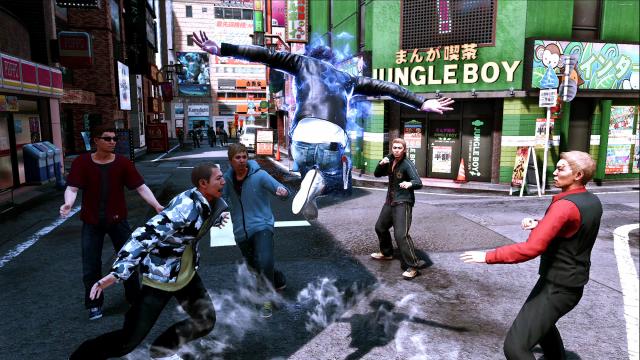
Like Judgment, Lost Judgment never really manages to capture that same sense of zaniness and over the top fun that has kept the Yakuza series feeling pretty fresh despite re-using the same sandbox more consistently than a dog on laxatives. Part of the problem might be Takayuki himself. Previous Yakuza protagonists usually had defined and unique personalities that made them fun to hang around with, be it Kazuma Kiryu just earnestly frowning at everything, Goro Majima giggling and cackling at every turn, or Ichiban Kasuga’s excitable and headstrong “punch first ask questions later” approach to life. That personality was infectious; it made the writing, the side events, and even the main story just pop and zing with color that much more.
Takayuki just... doesn’t have that. The charm and the likeability of previous Yakuza protagonists simply isn’t present. Perhaps that’s due to the attempt to make him more “relatable,” by not giving some of the more exaggerated personality traits of other Yakuza protagonists, but I would argue that relatability is something of a lost cause when we’re playing as someone who is simultaneously an accomplished attorney, a famous detective, and a master of kung fu. The quirkiness of Ichiban, Kiryu, and co. gave them genuine personality, made them fun to spend a 30-40 hour game with, and Takayuki just feels boring by comparison. You can have the most tragic backstory in the world and routinely beat up street thugs by the dozens, but if you aren’t an enjoyable character to be around then we might as well have just swapped in basically any other action game protagonist.
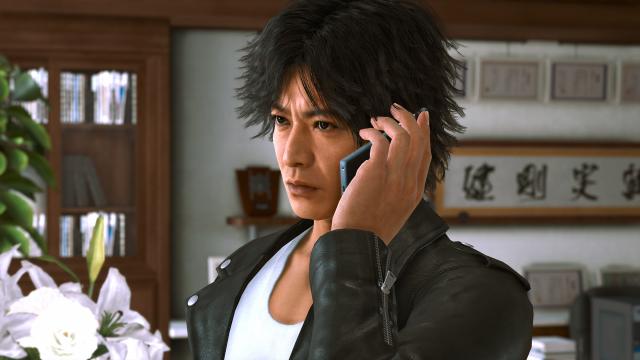
The rest of the cast is pretty boring as well, which is probably the other half of the reason why Judgment feels so muted and understated compared to its more excitable sister series. Takayuki’s main partner, Masaharu Kaito, is an ex-yakuza turned detective who is intended to be the comic relief to Takayuki’s more straight man when they’re on screen together. And he's at least kind of entertaining, but then of course a certain story event happens and he basically spends the entire second half of the plot offscreen. The other side characters, Fumiya, Makoto, Saori, etc. are pretty bland too, leaving me with no one who I really look forward to seeing on screen.
The various side activities feel pretty underwhelming too. There are a number of returning features, like gambling, shogi, arcades, and the series staple batting center. There’s also golf, darts, and a new game based around controlling a drone. But there’s nothing with the same depth as the business or club managing activities, or even so much as a kart racing minigame to liven things up. Some of the more narrative-focused side quests have a bit of flair to them, like one where you have to try and prevent a teacher from losing his temper with mischievous students or serve as an impromptu instructor and take a school's dance team to nationals, but there’s nothing that has that same charm or flair as Yakuza 6’s online chat room minigame or Like a Dragon’s business management or college courses.
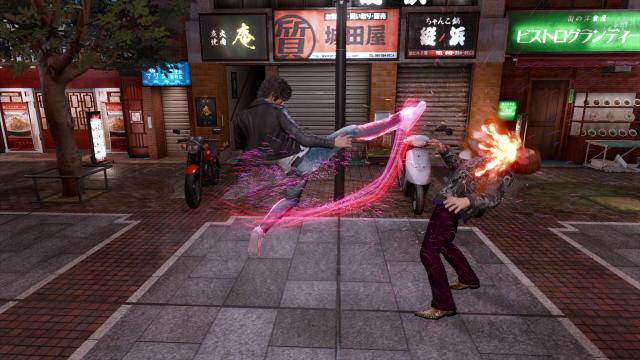
In short, despite potentially being the most polished Yakuza-esque game to date, Lost Judgment still fails to engage me on the same level as the Yakuza titles. Charm may be a rather nebulous concept, but it is perhaps what is necessary to carry a franchise that produces entries as often as Yakuza/Judgment does, and Takayuki’s games just don’t have that creative spark that keeps me wanting to play more. Kiryu and Ichiban’s adventures may not be as mechanically sound, especially in regards to the combat, but they have the witty writing and the fun characters to keep me invested. Judgment, conversely, doesn’t have that, and as a result its gameplay has to carry a lot more of the weight. And that is unfortunately a losing bet; even with the combat improved as it is, it’s not fleshed out enough to carry a whole game, and the weird detective/stealth/chase segments certainly don’t help. I don't think Lost Judgment is ultimately a bad title by any means, but it is one that (like its predecessor) I can't help but find disappointing, especially compared to last year's excellent Like a Dragon.
So I suppose the recommendation for Lost Judgment will pretty much come down to how much you liked Judgment. If you thought the original Judgment was great, then feel free to take this review with a Yokohoma sized grain of salt. Conversely, if you didn’t like Judgment, then this title won’t do much to change your mind, unless you somehow thought the one thing the first game was missing was the chance to beat up some high schoolers. If you’re new to these games as a whole, I’d recommend starting with the mainline Yakuza series instead, and maybe finding your way to the Judgment titles if you desperately find yourself in need of more when you’re done. Lost Judgment has, perhaps fittingly, somewhat lost itself. It’s focused so much on cleaning up the gameplay that it forgot what really gave Yakuza its appeal to begin with; the charm and soul of the writing, setting, and characters.









